A dozen favourite schoolday poems
A selection of some of the poems I learned at school.
By Robert Louis Stevenson, from A Child's Garden of Verses, 1885.
A strong rhythmic onomatopoeia, simulating the sound of a train on a fishplate-bolted track,
no longer heard on modern welded rails.
[1 of 12]

Faster than fairies, faster than witches,
Bridges and houses, hedges and ditches;
And charging along like troops in a battle,
All through the meadows the horses and cattle:
All of the sights of the hill and the plain
Fly as thick as driving rain;
And ever again, in the wink of an eye,
Painted stations whistle by.
Here is a child who clambers and scrambles,
All by himself and gathering brambles;
Here is a tramp who stands and gazes;
And there is the green for stringing the daisies!
Here is a cart run away in the road
Lumping along with man and load;
And here is a mill and there is a river:
Each a glimpse and gone for ever!
By Tomás de Iriarte, from Fábulas literarias, 1782,
translated from the Spanish by Richard Andrews, as Literary Fables, 1835.
This otherwise little-known ditty had a life-changing effect on me when it was read to me in my class of seven-year-old boys.
The teacher chose to explain the meaning of conceited
, then unwisely asked the class if they knew anyone to whom it applied. It seemed (to me) that the whole class then pointed at me.
I hope that I took the point!
[2 of 12]

A self-conceited duck, one day,
Was waddling from her pond away:
“What other race can boast”, she cried,
“The many gifts to ours allied?
Earth — water — air are all for us,
When I am tired of walking thus,
I fly, if so I take the whim,
Or if it pleases me I swim”.
A cunning serpent overheard
The boasting of the clumsy bird,
And, with contempt and scorn inflamed,
Came hissing up and thus exclaimed:
“It strikes me, ma'am, there's small occasion
For your just uttered proclamation;
These gifts of yours shine rather dim,
Since, neither like the trout you swim.
Nor, like the deer, step swift and light,
Nor match the eagle in your flight”.
They err who think that merit clings
To knowledge slight of many things;
He who his fellows would excel,
Whate'er he does should do it well.
By William Wordsworth, from Lyrical Ballads, 1799.
A maudlin and sentimental ballad, but apparently based on a true story, in which a young girl had fallen from a canal lock gate near Halifax, Yorkshire.
I recall first hearing it in early winter, when the moon was indeed visible in the late afternoon.
[3 of 12]
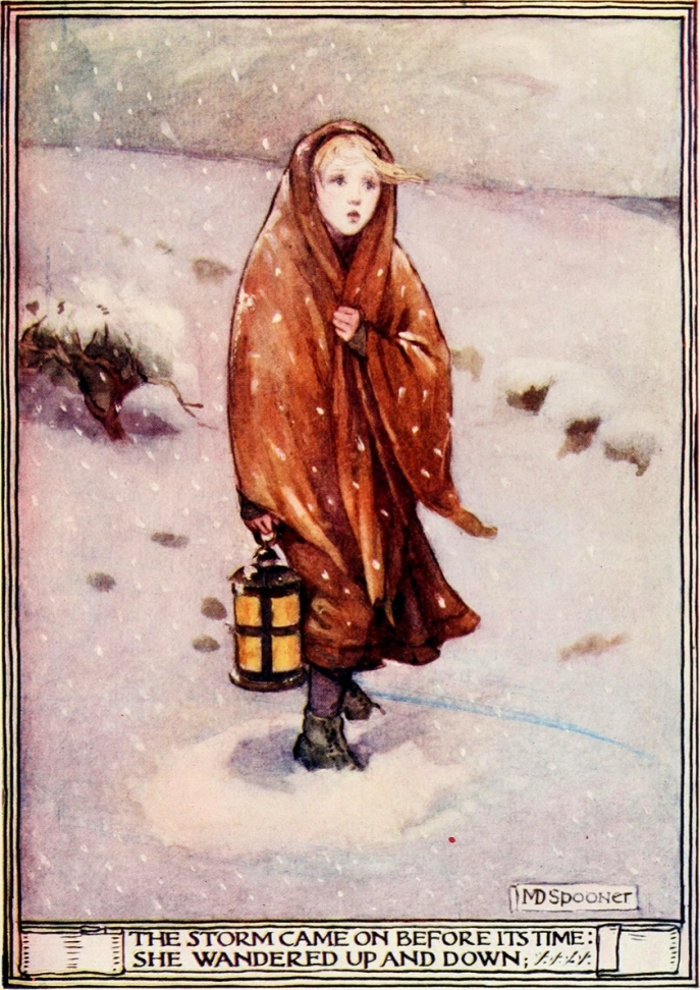
Oft I had heard of Lucy Gray,
And when I cross'd the Wild,
I chanc'd to see at break of day
The solitary Child.
No Mate, no comrade Lucy knew;
She dwelt on a wild Moor,
The sweetest Thing that ever grew
Beside a human door!
You yet may spy the Fawn at play,
The Hare upon the Green;
But the sweet face of Lucy Gray
Will never more be seen.
‘To-night will be a stormy night,
You to the Town must go,
And take a lantern, Child, to light
Your Mother thro' the snow.’
‘That, Father! will I gladly do;
'Tis scarcely afternoon—
The Minster-clock has just struck two,
And yonder is the Moon.’
At this the Father rais'd his hook
And snapp'd a faggot-band;
He plied his work, and Lucy took
The lantern in her hand.
Not blither is the mountain roe,
With many a wanton stroke
Her feet disperse, the powd'ry snow
That rises up like smoke.
The storm came on before its time,
She wander'd up and down,
And many a hill did Lucy climb
But never reach'd the Town.
The wretched Parents all that night
Went shouting far and wide;
But there was neither sound nor sight
To serve them for a guide.
At day-break on a hill they stood
That overlook'd the Moor;
And thence they saw the Bridge of Wood
A furlong from their door.
And now they homeward turn'd, and cry'd
‘In Heaven we all shall meet!’
When in the snow the Mother spied
The print of Lucy's feet.
Then downward from the steep hill's edge
They track'd the footmarks small;
And through the broken hawthorn-hedge,
And by the long stone-wall;
And then an open field they cross'd,
The marks were still the same;
They track'd them on, nor ever lost,
And to the Bridge they came.
They follow'd from the snowy bank
The footmarks, one by one,
Into the middle of the plank,
And further there were none.
Yet some maintain that to this day
She is a living Child,
That you may see sweet Lucy Gray
Upon the lonesome Wild.
O'er rough and smooth she trips along,
And never looks behind;
And sings a solitary song
That whistles in the wind.
By Robert Browning, from Dramatic Romances and Lyrics, 1845.
Another strong rhythmic onomatopoeia, this time mimicking the horses' hooves.
Apparently it is a pure fiction, and not based on any historical event.
The place names are genuine locations in Belgium.
Aix is Aix-la-Chapelle, now better known as Aachen in Germany.
We retraced the opposite journey from Aix to Ghent when returning from our visit to Germany in 2019. Many of the village names are still posted on exit signs from the E313/E314 motorways.
Our dramatic journey began with a hour's delay due to a serious accident outside Aachen,
and ended with a spectacular thunderstorm outside Ghent.
[4 of 12]
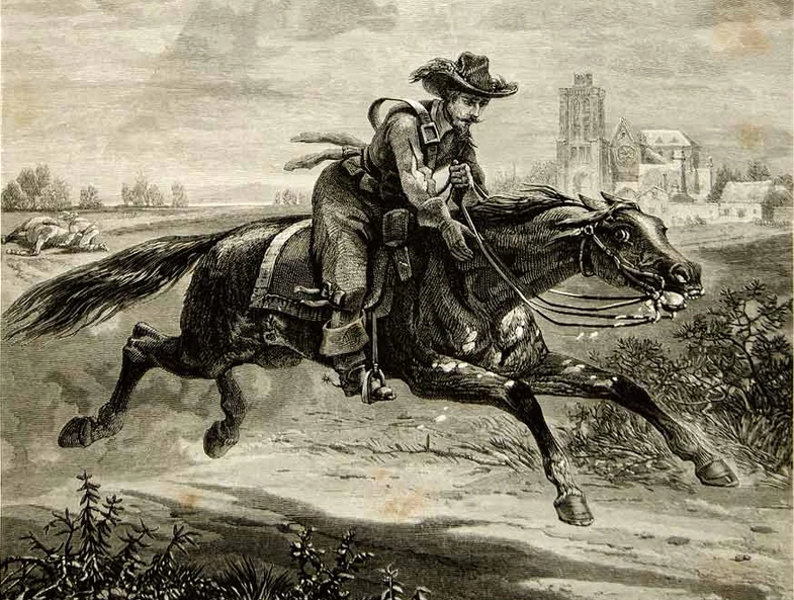
I sprang to the stirrup, and Joris, and he;
I galloped, Dirck galloped, we galloped all three;
‘Good speed!’ cried the watch, as the gate-bolts undrew;
‘Speed!’ echoed the wall to us galloping through;
Behind shut the postern, the lights sank to rest,
And into the midnight we galloped abreast.
Not a word to each other; we kept the great pace
Neck by neck, stride by stride, never changing our place;
I turned in my saddle and made its girths tight,
Then shortened each stirrup, and set the pique right,
Rebuckled the cheek-strap, chained slacker the bit,
Nor galloped less steadily Roland a whit.
'Twas moonset at starting; but while we drew near
Lokeren, the cocks crew and twilight dawned clear;
At Boom, a great yellow star came out to see;
At Düffeld, ’twas morning as plain as could be;
And from Mecheln church-steeple we heard the half-chime,
So Joris broke silence with ‘Yet there is time!’
At Aerschot, up leaped of a sudden the sun,
And against him the cattle stood black every one,
To stare through the mist at us galloping past,
And I saw my stout galloper Roland at last,
With resolute shoulders, each butting away
The haze, as some bluff river headland its spray.
And his low head and crest, just one sharp ear bent back
For my voice, and the other pricked out on his track;
And one eye's black intelligence,—ever that glance
O'er its white edge at me, his own master, askance!
And the thick heavy spume-flakes which aye and anon
His fierce lips shook upwards in galloping on.
By Hasselt, Dirck groaned; and cried Joris, ‘Stay spur!
Your Roos galloped bravely, the fault's not in her,
We'll remember at Aix’—for one heard the quick wheeze
Of her chest, saw the stretched neck and staggering knees,
And sunk tail, and horrible heave of the flank,
As down on her haunches she shuddered and sank.
So we were left galloping, Joris and I,
Past Looz and past Tongres, no cloud in the sky;
The broad sun above laughed a pitiless laugh,
'Neath our feet broke the brittle bright stubble like chaff;
Till over by Dalhem a dome-spire sprang white,
And ‘Gallop,’ gasped Joris, ‘for Aix is in sight!’
‘How they'll greet us!’—and all in a moment his roan
Rolled neck and croup over, lay dead as a stone;
And there was my Roland to bear the whole weight
Of the news which alone could save Aix from her fate,
With his nostrils like pits full of blood to the brim,
And with circles of red for his eye-sockets’ rim.
Then I cast loose my buffcoat, each holster let fall,
Shook off both my jack-boots, let go belt and all,
Stood up in the stirrup, leaned, patted his ear,
Called my Roland his pet-name, my horse without peer;
Clapped my hands, laughed and sang, any noise, bad or good,
Till at length into Aix Roland galloped and stood.
And all I remember is, friends flocking round
As I sat with his head 'twixt my knees on the ground;
And no voice but was praising this Roland of mine,
As I poured down his throat our last measure of wine,
Which (the burgesses voted by common consent)
Was no more than his due who brought good news from Ghent.
By Henry Wadsworth Longfellow, published in The New World, 1840.
Another maudlin and sentimental ballad, loosely based of the wreck of the schooner Favorite
out of Wiscasset, Maine, off Norman's Woe, Massachusetts, in December 1839.
A favourite expression of my Mum's (and of many others),
when someone's appearance was untidy or unkempt,
was to say You look like the wreck of the Hesperus!
.
[5 of 12]

It was the schooner Hesperus,
That sailed the wintry sea;
And the skipper had taken his little daughtèr,
To bear him company.
Blue were her eyes as the fairy-flax,
Her cheeks like the dawn of day,
And her bosom white as the hawthorn buds,
That ope in the month of May.
The skipper he stood beside the helm,
His pipe was in his mouth,
And he watched how the veering flaw did blow
The smoke now West, now South.
Then up and spake an old Sailòr,
Had sailed to the Spanish Main,
“I pray thee, put into yonder port,
For I fear a hurricane.
“Last night, the moon had a golden ring,
And to-night no moon we see!”
The skipper, he blew a whiff from his pipe,
And a scornful laugh laughed he.
Colder and louder blew the wind,
A gale from the Northeast,
The snow fell hissing in the brine,
And the billows frothed like yeast.
Down came the storm, and smote amain
The vessel in its strength;
She shuddered and paused, like a frighted steed,
Then leaped her cable's length.
“Come hither! come hither! my little daughtèr,
And do not tremble so;
For I can weather the roughest gale
That ever wind did blow.”
He wrapped her warm in his seaman's coat
Against the stinging blast;
He cut a rope from a broken spar,
And bound her to the mast.
“O father! I hear the church-bells ring,
Oh say, what may it be?”
“'T is a fog-bell on a rock-bound coast!” —
And he steered for the open sea.
“O father! I hear the sound of guns,
Oh say, what may it be?”
“Some ship in distress, that cannot live
In such an angry sea!”
“O father! I see a gleaming light,
Oh say, what may it be?”
But the father answered never a word,
A frozen corpse was he.
Lashed to the helm, all stiff and stark,
With his face turned to the skies,
The lantern gleamed through the gleaming snow
On his fixed and glassy eyes.
Then the maiden clasped her hands and prayed
That savèd she might be;
And she thought of Christ, who stilled the wave
On the Lake of Galilee.
And fast through the midnight dark and drear,
Through the whistling sleet and snow,
Like a sheeted ghost, the vessel swept
Tow'rds the reef of Norman's Woe.
And ever the fitful gusts between
A sound came from the land;
It was the sound of the trampling surf
On the rocks and the hard sea-sand.
The breakers were right beneath her bows,
She drifted a dreary wreck,
And a whooping billow swept the crew
Like icicles from her deck.
She struck where the white and fleecy waves
Looked soft as carded wool,
But the cruel rocks, they gored her side
Like the horns of an angry bull.
Her rattling shrouds, all sheathed in ice,
With the masts went by the board;
Like a vessel of glass, she stove and sank,
Ho! ho! the breakers roared!
At daybreak, on the bleak sea-beach,
A fisherman stood aghast,
To see the form of a maiden fair,
Lashed close to a drifting mast.
The salt sea was frozen on her breast,
The salt tears in her eyes;
And he saw her hair, like the brown sea-weed,
On the billows fall and rise.
Such was the wreck of the Hesperus,
In the midnight and the snow!
Christ save us all from a death like this,
On the reef of Norman's Woe!
By Charles Wolfe, first published in The Newry Telegraph, 1817.
Notable for the use of the archaic corse
rather than corpse
.
Some references have at
rather than after
in the title,
and some have not
rather than nor
in the first line.
Famously quoted by Nigel Molesworth in
How to be Topp by Geoffrey Willans and Ronald Searle.
[6 of 12]

Not a drum was heard, nor a funeral note,
As his corse to the rampart we hurried;
Not a soldier discharged his farewell shot
O'er the grave where our hero we buried.
We buried him darkly at dead of night,
The sods with our bayonets turning;
By the struggling moonbeam's misty light
And the lantern dimly burning.
No useless coffin enclosed his breast,
Nor in sheet nor in shroud we wound him,
But he lay like a warrior taking his rest
With his martial cloak around him.
Few and short were the prayers we said,
And we spoke not a word of sorrow;
But we steadfastly gazed on the face that was dead,
And we bitterly thought of the morrow.
We thought, as we hollowed his narrow bed
And smoothed down his lonely pillow,
That the foe and the stranger would tread o'er his head,
And we far away on the billow!
Lightly they'll talk of the spirit that's gone
And o'er his cold ashes upbraid him,
But little he'll reck, if they let him sleep on
In the grave where a Briton has laid him.
But half of our heavy task was done
When the clock struck the hour for retiring;
And we heard the distant and random gun
That the foe was sullenly firing.
Slowly and sadly we laid him down,
From the field of his fame fresh and gory;
We carved not a line, and we raised not a stone,
But left him alone with his glory.
By John Keats. One of several 1819 odes
, it was composed after a walk beside the River Itchen near Winchester one autumnal evening, and published in Lamia, Isabella, The Eve of St Agnes, and other poems, 1820.
Our English master, Brother Engel, alluded to the biological themes of
conspiring... to load and bless with fruit
, etc,
but declined to discuss the facts of life
with his adolescent class,
and said we should ask our fathers (or the headmaster).
[7 of 12]

Season of mists and mellow fruitfulness!
Close bosom-friend of the maturing sun;
Conspiring with him how to load and bless
With fruit the vines that round the thatch-eaves run;
To bend with apples the moss'd cottage-trees,
And fill all fruit with ripeness to the core;
To swell the gourd, and plump the hazel shells
With a sweet kernel; to set budding more,
And still more, later flowers for the bees,
Until they think warm days will never cease,
For Summer has o'er-brimm'd their clammy cells.
Who hath not seen thee oft amid thy store?
Sometimes whoever seeks abroad may find
Thee sitting careless on a granary floor,
Thy hair soft-lifted by the winnowing wind;
Or on a half-reap'd furrow sound asleep,
Drowsed with the fume of poppies, while thy hook
Spares the next swath and all its twinèd flowers;
And sometimes like a gleaner thou dost keep
Steady thy laden head across a brook;
Or by a cider-press, with patient look,
Thou watchest the last oozings hours by hours.
Where are the songs of Spring? Ay, where are they?
Think not of them, thou hast thy music too,—
While barrèd clouds bloom the soft-dying day,
And touch the stubble-plains with rosy hue;
Then in a wailful choir the small gnats mourn
Among the river sallows, borne aloft
Or sinking as the light wind lives or dies;
And full-grown lambs loud bleat from hilly bourn;
Hedge-crickets sing; and now with treble soft
The redbreast whistles from a garden-croft;
And gathering swallows twitter in the skies.
By Sir Henry Newbolt, from Admirals All, 1897.
The poem’s title, meaning The Torch of Life, is taken from the Latin poem
De rerum natura by Lucretius,
where it refers to the torch handed over in a relay race.
The sentiment of equating the sporting courage of cricket with that of war is now badly dated,
but seemed nobly patriotic at the time.
Newbolt was a childhood friend of Douglas Haig (later The Butcher of The Somme
).
[8 of 12]
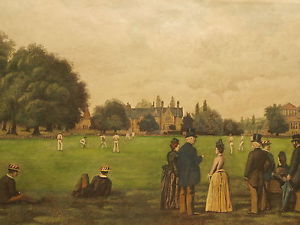
There’s a breathless hush in the Close to-night—
Ten to make and the match to win—
A bumping pitch and a blinding light,
An hour to play and the last man in.
And it’s not for the sake of a ribboned coat,
Or the selfish hope of a season’s fame,
But his Captain’s hand on his shoulder smote—
“Play up! play up! and play the game!”
The sand of the desert is sodden red,—
Red with the wreck of a square that broke;—
The Gatling’s jammed and the Colonel dead,
And the regiment blind with dust and smoke.
The river of death has brimmed his banks,
And England’s far, and Honour a name,
But the voice of a schoolboy rallies the ranks:
“Play up! play up! and play the game!”
This is the word that year by year,
While in her place the School is set,
Every one of her sons must hear,
And none that hears it dare forget.
This they all with a joyful mind
Bear through life like a torch in flame,
And falling fling to the host behind—
“Play up! play up! and play the game!”
By John Masefield, from Salt-Water Ballads, 1902.
Later, in The Collected Poems of John Masefield, 1923,
the opening phrase was changed to the more trite
I must go down to the sea again
,
which is more often quoted, but I prefer the original.
[9 of 12]
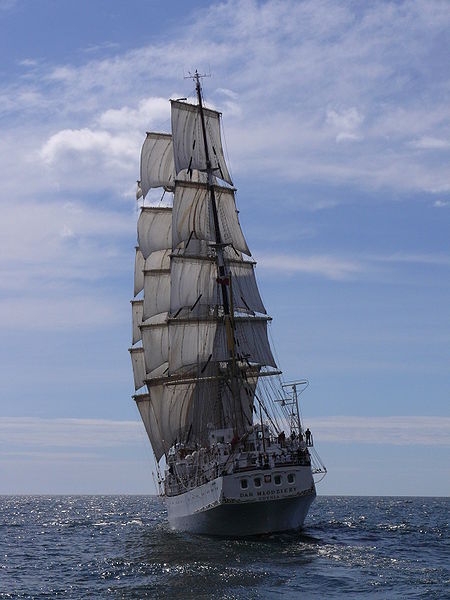
I must down to the seas again, to the lonely sea and the sky,
And all I ask is a tall ship and a star to steer her by,
And the wheel's kick and the wind's song and the white sail's shaking,
And a grey mist on the sea's face and a grey dawn breaking.
I must down to the seas again, for the call of the running tide
Is a wild call and a clear call that may not be denied;
And all I ask is a windy day with the white clouds flying,
And the flung spray and the blown spume, and the sea-gulls crying.
I must down to the seas again to the vagrant gypsy life.
To the gull's way and the whale's way where the wind's like a whetted knife;
And all I ask is a merry yarn from a laughing fellow-rover,
And quiet sleep and a sweet dream when the long trick's over.
By John Masefield, from Ballads, 1903.
Another nautical poem about cargo ships from ancient to modern times.
No problems then about the existence of Palestine.
A moidore is a small Portugese gold coin.
[10 of 12]
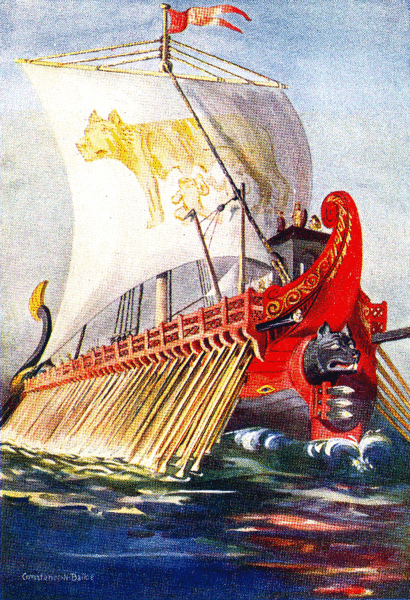
Quinquireme of Nineveh from distant Ophir,
Rowing home to haven in sunny Palestine,
With a cargo of ivory,
And apes and peacocks,
Sandalwood, cedarwood, and sweet white wine.
Stately Spanish galleon coming from the Isthmus,
Dipping through the Tropics by the palm-green shores,
With a cargo of diamonds,
Emeralds, amythysts,
Topazes, and cinnamon, and gold moidores.
Dirty British coaster with a salt-caked smoke stack,
Butting through the Channel in the mad March days,
With a cargo of Tyne coal,
Road-rails, pig-lead,
Firewood, iron-ware, and cheap tin trays.
The last stanza is firmly rooted in the early twentieth century.
As new stanzas for 2020, I offer these:
Container ship from China encircling the planet,
Choking all the atmosphere with oil-based fuels,
With a cargo of tee-shirts,
Smartphones, TVs,
Golf clubs, power tools, and ersatz jewels.
Cruise ships from everywhere, seeking the sunshine,
Full of wealthy passengers leading luxury lives,
With a cargo of virus,
Illness, suffering,
Becalmed in the estuary till the vaccine arrives.
By Hilaire Belloc, from Highways and Byways in Sussex, 1904.
While it is proudly nostalgic for the Sussex Weald,
I always felt that this poem was particularly dismissive of the Midlands,
one of the places from which the roots of my family sprang.
[11 of 12]

When I am living in the Midlands
That are sodden and unkind,
I light my lamp in the evening:
My work is left behind;
And the great hills of the South Country
Come back into my mind.
The great hills of the South Country
They stand along the sea;
And it's there walking in the high woods
That I could wish to be,
And the men that were boys when I was a boy
Walking along with me.
The men that live in North England
I saw them for a day:
Their hearts are set upon the waste fells,
Their skies are fast and grey;
From their castle-walls a man may see
The mountains far away.
The men that live in West England
They see the Severn strong,
A-rolling on rough water brown
Light aspen leaves along.
They have the secret of the Rocks,
And the oldest kind of song.
But the men that live in the South Country
Are the kindest and most wise,
They get their laughter from the loud surf,
And the faith in their happy eyes
Comes surely from our Sister the Spring
When over the sea she flies;
The violets suddenly bloom at her feet,
She blesses us with surprise.
I never get between the pines
But I smell the Sussex air;
Nor I never come on a belt of sand
But my home is there.
And along the sky the line of the Downs
So noble and so bare.
A lost thing could I never find,
Nor a broken thing mend:
And I fear I shall be all alone
When I get towards the end.
Who will there be to comfort me
Or who will be my friend?
I will gather and carefully make my friends
Of the men of the Sussex Weald;
They watch the stars from silent folds,
They stiffly plough the field.
By them and the God of the South Country
My poor soul shall be healed.
If I ever become a rich man,
Or if ever I grow to be old,
I will build a house with deep thatch
To shelter me from the cold,
And there shall the Sussex songs be sung
And the story of Sussex told.
I will hold my house in the high wood
Within a walk of the sea,
And the men that were boys when I was a boy
Shall sit and drink with me.
By Edward Thomas, 1917. Published in Collected Poems, 1920.
A wonderfully evocative poem of a train stopping at a sleepy Gloucestershire station in high summer.
Allegedly, the nearby Adlestrop House was the inspiration for Jane Austen's
Mansfield Park.
The station was closed in 1966 as part of the Beeching cuts.
A bus stop — holding the station nameplate and a station bench embellished with the poem —
is now all that remains.
[12 of 12]

Yes. I remember Adlestrop—
The name, because one afternoon
Of heat the express-train drew up there
Unwontedly. It was late June.
The steam hissed. Someone cleared his throat.
No one left and no one came
On the bare platform. What I saw
Was Adlestrop—only the name
And willows, willow-herb, and grass,
And meadowsweet, and haycocks dry,
No whit less still and lonely fair
Than the high cloudlets in the sky.
And for that minute a blackbird sang
Close by, and round him, mistier,
Farther and farther, all the birds
Of Oxfordshire and Gloucestershire.
 This work is licensed under a Creative Commons Attribution-NonCommercial-ShareAlike 4.0 International License.
This work is licensed under a Creative Commons Attribution-NonCommercial-ShareAlike 4.0 International License.
 This work is licensed under a Creative Commons Attribution-NonCommercial-ShareAlike 4.0 International License.
This work is licensed under a Creative Commons Attribution-NonCommercial-ShareAlike 4.0 International License.











 This work is licensed under a Creative Commons Attribution-NonCommercial-ShareAlike 4.0 International License.
This work is licensed under a Creative Commons Attribution-NonCommercial-ShareAlike 4.0 International License.